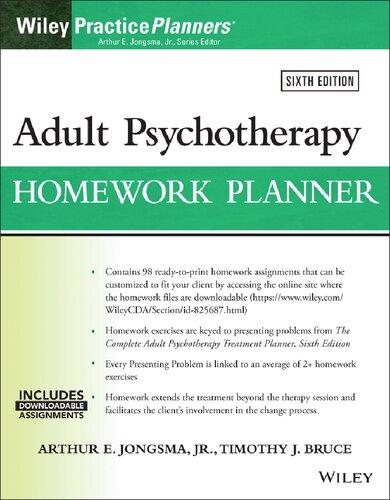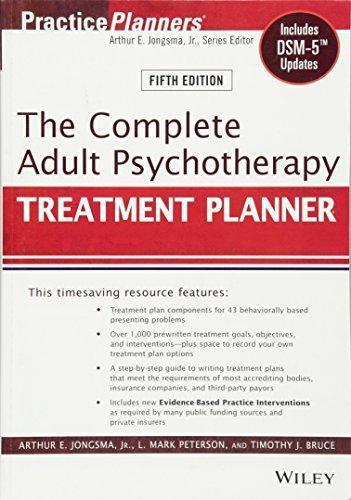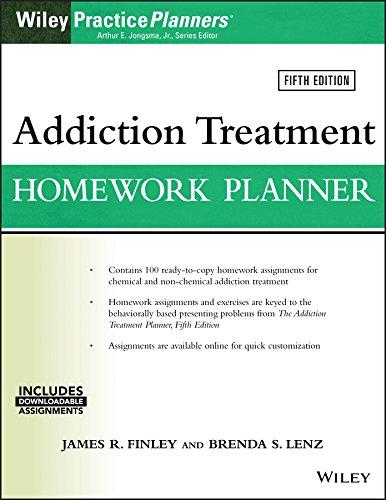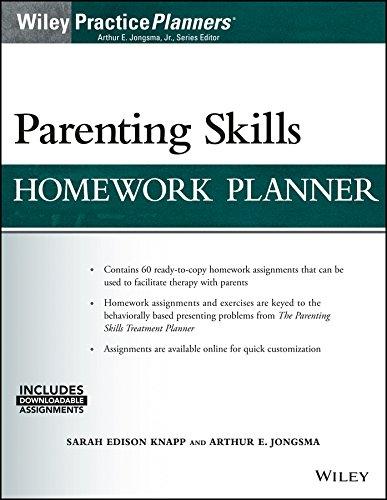Visit to download the full and correct content document: https://ebookmass.com/product/adult-psychotherapy-homework-planner-6th-edition-d avid-j-bruce-timothy-j-berghuis/
More products digital (pdf, epub, mobi) instant download maybe you interests ...
Treatment Homework Planner (PracticePlanners)
https://ebookmass.com/product/addiction-treatment-homeworkplanner-practiceplanners/
https://ebookmass.com/product/the-complete-adult-psychotherapytreatment-planner-includes-dsm-5-updates-ebook-pdf-version/
https://ebookmass.com/product/the-adolescent-psychotherapytreatment-planner-practiceplanners-6th-ed-6th-edition-arthur-ejongsma/
https://ebookmass.com/product/addiction-treatment-homeworkplanner-practiceplanners-5th-edition-ebook-pdf-version/
AUDITING and ASSURANCE SERVICES 9th Edition Timothy J. Louwers
https://ebookmass.com/product/auditing-and-assuranceservices-9th-edition-timothy-j-louwers/
Auditing and Assurance Services 7th Edition Timothy J. Louwers
https://ebookmass.com/product/auditing-and-assuranceservices-7th-edition-timothy-j-louwers/
Parenting Skills Homework Planner (w/ Download) (PracticePlanners) 1st Edition – Ebook PDF Version
https://ebookmass.com/product/parenting-skills-homework-plannerw-download-practiceplanners-1st-edition-ebook-pdf-version/
Breast Pathology 2nd Edition David J Dabbs
https://ebookmass.com/product/breast-pathology-2nd-edition-davidj-dabbs/
Breast Surgery 6th Edition J Michael Dixon
https://ebookmass.com/product/breast-surgery-6th-edition-jmichael-dixon/
AdultPsychotherapy HomeworkPlanner SixthEdition PracticePlanners® Series TreatmentPlanners
TheCompleteAdultPsychotherapyTreatmentPlanner,Sixth Edition
TheChildPsychotherapyTreatmentPlanner,SixthEdition
TheAdolescentPsychotherapyTreatmentPlanner,Sixth Edition
TheAddictionTreatmentPlanner,SixthEdition
TheContinuumofCareTreatmentPlanner
TheCouplesPsychotherapyTreatmentPlanner,Second Edition
TheEmployeeAssistanceTreatmentPlanner
ThePastoralCounselingTreatmentPlanner
TheOlderAdultPsychotherapyTreatmentPlanner,Second Edition
TheBehavioralMedicineTreatmentPlanner
TheGroupTherapyTreatmentPlanner
TheGayandLesbianPsychotherapyTreatmentPlanner
TheFamilyTherapyTreatmentPlanner,SecondEdition
TheSevereandPersistentMentalIllnessTreatmentPlanner, SecondEdition
TheIntellectualandDevelopmentalDisabilitiesTreatment Planner
TheSocialWorkandHumanServicesTreatmentPlanner
TheCrisisCounselingandTraumaticEventsTreatments Planner,SecondEdition
ThePersonalityDisordersTreatmentPlanner
TheRehabilitationPsychologyTreatmentPlanner
TheSpecialEducationTreatmentPlanner
TheJuvenileJusticeandResidentialCareTreatmentPlanner
TheSchoolCounselingandSchoolSocialWorkTreatment Planner,SecondEdition
TheSexualAbuseVictimandSexualOffenderTreatment Planner
TheProbationandParoleTreatmentPlanner
ThePsychopharmacologyTreatmentPlanner
TheSpeech-LanguagePathologyTreatmentPlanner
TheSuicideandHomicideTreatmentPlanner
TheCollegeStudentCounselingTreatmentPlanner
TheParentingSkillsTreatmentPlanner
TheEarlyChildhoodEducationInterventionTreatment Planner
TheCo-OccurringDisordersTreatmentPlanner
TheCompleteWomen’sPsychotherapyTreatmentPlanner
TheVeteransandActiveDutyMilitaryPsychotherapy TreatmentPlanner
ProgressNotesPlanners TheChildPsychotherapyProgressNotesPlanner,Fifth Edition
TheAdolescentPsychotherapyProgressNotesPlanner,Fifth Edition
TheAdultPsychotherapyProgressNotesPlanner,Fifth Edition
TheAddictionProgressNotesPlanner,FifthEdition
TheSevereandPersistentMentalIllnessProgressNotes Planner,SecondEdition
TheCouplesPsychotherapyProgressNotesPlanner,Second Edition
TheFamilyTherapyProgressNotesPlanner,SecondEdition
TheVeteransandActiveDutyMilitaryPsychotherapy ProgressNotesPlanner
HomeworkPlanners CouplesTherapyHomeworkPlanner,SecondEdition FamilyTherapyHomeworkPlanner,SecondEdition GriefCounselingHomeworkPlanner
GroupTherapyHomeworkPlanner
DivorceCounselingHomeworkPlanner
SchoolCounselingandSchoolSocialWorkHomework Planner,SecondEdition
ChildTherapyActivityandHomeworkPlanner
AddictionTreatmentHomeworkPlanner,FifthEdition AdolescentPsychotherapyHomeworkPlanner,FifthEdition AdultPsychotherapyHomeworkPlanner,SixthEdition ChildPsychotherapyHomeworkPlanner,FifthEdition ParentingSkillsHomeworkPlanner
VeteransandActiveDutyMilitaryPsychotherapyHomework Planner
ClientEducationHandoutPlanners
AdultClientEducationHandoutPlanner
ChildandAdolescentClientEducationHandoutPlanner
CouplesandFamilyClientEducationHandoutPlanner
CompletePlanners TheCompleteDepressionTreatmentandHomeworkPlanner
TheCompleteAnxietyTreatmentandHomeworkPlanner
AdultPsychotherapy HomeworkPlanner SixthEdition ArthurE.Jongsma,Jr. TimothyJ.Bruce
Thiseditionfirstpublished2022 ©2022JohnWiley&Sons,Inc.
EditionHistory
JohnWiley&Sons,Inc.(1e,2001);JohnWiley&Sons,Inc.(2e,2003);JohnWiley&Sons,Inc.(3e,2006);John Wiley&Sons,Inc.(5e,2014)
Allrightsreserved.Nopartofthispublicationmaybereproduced,storedinaretrievalsystem,ortransmitted, inanyformorbyanymeans,electronic,mechanical,photocopying,recordingorotherwise,exceptaspermitted bylaw.Adviceonhowtoobtainpermissiontoreusematerialfromthistitleisavailableat http://www.wiley.com/ go/permissions
TherightofArthurE.Jongsma,Jr.andTimothyJ.Brucetobeidentifiedastheauthorsofthisworkhasbeen assertedinaccordancewithlaw.
RegisteredOffice
JohnWiley&Sons,Inc.,111RiverStreet,Hoboken,NJ07030,USA
EditorialOffice
111RiverStreet,Hoboken,NJ07030,USA
Fordetailsofourglobaleditorialoffices,customerservices,andmoreinformationaboutWileyproductsvisitus at www.wiley.com.
Wileyalsopublishesitsbooksinavarietyofelectronicformatsandbyprint-on-demand.Somecontentthat appearsinstandardprintversionsofthisbookmaynotbeavailableinotherformats.
LimitofLiability/DisclaimerofWarranty
Thecontentsofthisworkareintendedtofurthergeneralscientificresearch,understanding,anddiscussiononly andarenotintendedandshouldnotberelieduponasrecommendingorpromotingscientificmethod,diagnosis, ortreatmentbyphysiciansforanyparticularpatient.Inviewofongoingresearch,equipmentmodifications, changesingovernmentalregulations,andtheconstantflowofinformationrelatingtotheuseofmedicines, equipment,anddevices,thereaderisurgedtoreviewandevaluatetheinformationprovidedinthepackageinsert orinstructionsforeachmedicine,equipment,ordevicefor,amongotherthings,anychangesintheinstructions orindicationofusageandforaddedwarningsandprecautions.Whilethepublisherandauthorshaveusedtheir besteffortsinpreparingthiswork,theymakenorepresentationsorwarrantieswithrespecttotheaccuracy orcompletenessofthecontentsofthisworkandspecificallydisclaimallwarranties,includingwithoutlimitation anyimpliedwarrantiesofmerchantabilityorfitnessforaparticularpurpose.Nowarrantymaybecreatedor extendedbysalesrepresentatives,writtensalesmaterialsorpromotionalstatementsforthiswork.Thefactthat anorganization,website,orproductisreferredtointhisworkasacitationand/orpotentialsourceoffurther informationdoesnotmeanthatthepublisherandauthorsendorsetheinformationorservicestheorganization, website,orproductmayprovideorrecommendationsitmaymake.Thisworkissoldwiththeunderstanding thatthepublisherisnotengagedinrenderingprofessionalservices.Theadviceandstrategiescontained hereinmaynotbesuitableforyoursituation.Youshouldconsultwithaspecialistwhereappropriate.Further, readersshouldbeawarethatwebsiteslistedinthisworkmayhavechangedordisappearedbetweenwhenthis workwaswrittenandwhenitisread.Neitherthepublishernorauthorsshallbeliableforanylossofprofitor anyothercommercialdamages,includingbutnotlimitedtospecial,incidental,consequential,orotherdamages.
LibraryofCongressCataloging-in-PublicationData
Names:Jongsma,ArthurE.,Jr.,1943-author.|Bruce,TimothyJ.,author.
Title:Adultpsychotherapyhomeworkplanner/ArthurE.Jongsma,Jr., TimothyJ.Bruce.
Description:Sixthedition.|Hoboken,NJ:Wiley,[2022]|Series: Practiceplanners
Identifiers:LCCN2021022332(print)|LCCN2021022333(ebook)|ISBN 9781119840848(paperback)|ISBN9781119841067(adobepdf)|ISBN 9781119841050(epub)
Subjects:LCSH:Psychotherapy—Planning—Handbooks,manuals,etc.| Psychotherapy—Problems,exercises,etc.
Classification:LCCRC480.5.J6642022(print)|LCCRC480.5(ebook)| DDC616.89/14—dc23
LCrecordavailableathttps://lccn.loc.gov/2021022332
LCebookrecordavailableathttps://lccn.loc.gov/2021022333
CoverDesign:Wiley
CoverImage:©RyanMcVay/GettyImages
Setin11.5/14.5ptNewCenturySchlbkLTStdbyStraive,Chennai,India
ToDaveandLorrieVanderArk, whosefriendshiphasenrichedourlivesand whosesupportismorereliablethanafinetimepiece AEJ
TomycolleaguesandresidentsattheUniversityofIllinois. Ithasbeenanhonorandpleasureworkingwithyou. TJB
AbouttheDownloadableAssignmentsxiii PracticePlanners® SeriesPrefacexv Acknowledgmentsxvii
Introduction 1
SECTION1:AngerControlProblems4
Exercise1.AAlternativestoDestructiveAnger5
Exercise1.BAngerJournal9
Exercise1.CAssertiveCommunicationofAnger12
SECTION2:AntisocialBehavior14
Exercise2.AHowIHaveHurtOthers15
Exercise2.BLetterofApology18
Exercise2.CThreeActsofKindness20
SECTION3:Anxiety21
Exercise3.AAnalyzetheProbabilityofaFearedEvent22
Exercise3.BPastSuccessfulAnxietyCoping25
Exercise3.CWorryTime28
SECTION4:AttentionDeficitHyperactivityDisorder(ADHD)—Adult30
Exercise4.AProblem-Solving:AnAlternativetoImpulsiveAction31
Exercise4.BSelf-Monitoring/Self-RewardProgram35
Exercise4.CSymptomsandFixesforADHD39
SECTION5:BipolarDisorder—Depression42
Exercise5.AEarlyWarningSignsofDepression43
Exercise5.BIdentifyingandHandlingTriggers46
SECTION6:BipolarDisorder—Mania50
Exercise6.AKeepingaDailyRhythm52
Exercise6.BRecognizingtheNegativeConsequencesof ImpulsiveBehavior58
viiiCONTENTS
Exercise6.CWhatAreMyGoodQualities?62
Exercise6.DWhyIDislikeTakingMyMedication66
SECTION7:BorderlinePersonalityDisorder68
Exercise7.AJournalandReplaceSelf-DefeatingThoughts69
Exercise7.BPlanBeforeActing76
SECTION8:ChildhoodTrauma78
Exercise8.AChangingFromVictimtoSurvivor79
Exercise8.BDeepBreathingExercise83
Exercise8.CFeelingsandForgivenessLetter86
SECTION9:ChronicPain89
Exercise9.APainandStressJournal90
SECTION10:CognitiveDeficits92
Exercise10.AMemoryAid—PersonalInformationOrganizer93
Exercise10.BMemoryEnhancementTechniques98
SECTION11:Dependency101
Exercise11.AMakingYourOwnDecisions102
Exercise11.BSatisfyingUnmetEmotionalNeeds104
Exercise11.CTakingStepsTowardIndependence107
SECTION12:Depression—Unipolar109
Exercise12.AIdentifyandSchedulePleasantActivities110
Exercise12.BNegativeThoughtsTriggerNegativeFeelings113
Exercise12.CPositiveSelf-Talk118
SECTION13:Dissociation120
Exercise13.ADescribetheTrauma121
Exercise13.BStayingFocusedonthePresentReality124
SECTION14:EatingDisordersandObesity126
Exercise14.AARealityJournal:Food,Weight,Thoughts,andFeelings127
Exercise14.BHowFearsControlMyEating134
SECTION15:EducationalDeficits137
Exercise15.AMyAcademicandVocationalStrengths138
Exercise15.BTheAdvantagesofEducation141
SECTION16:FamilyConflict143
Exercise16.AApplyingProblem-SolvingtoInterpersonalConflict144
Exercise16.BAStructuredParentingPlan147
SECTION17:FemaleSexualDysfunction150
Exercise17.AFactorsInfluencingNegativeSexualAttitudes151
Exercise17.BStudyYourBody:ClothedandUnclothed155
SECTION18:FinancialStress158
Exercise18.APlanaBudget159
SECTION19:Grief/LossUnresolved162
Exercise19.ACreatingaMemorialCollage163
Exercise19.BDear________:ALettertoaLostLovedOne166
SECTION20:ImpulseControlDisorder169
Exercise20.AImpulsiveBehaviorJournal170
SECTION21:IntimateRelationshipConflicts173
Exercise21.AHowCanWeMeetEachOther’sNeedsandDesires?174
Exercise21.BPositiveandNegativeContributionstotheRelationship: MineandYours179
SECTION22:LegalConflicts181
Exercise22.AAcceptResponsibilityforIllegalBehavior182
Exercise22.BCrookedThinkingLeadstoCrookedBehavior185
SECTION23:Loneliness187
Exercise23.AIdentifyingWhatIValue188
Exercise23.BMindfulnessExercises194
Exercise23.CLettingGoofUnhelpfulThoughts198
xCONTENTS
SECTION24:LowSelf-Esteem200
Exercise24.AAcknowledgingMyStrengths201 Exercise24.BReplacingFearsWithPositiveMessages204
SECTION25:MaleSexualDysfunction207
Exercise25.AJournalingtheResponsetoNondemandSexual Pleasuring(SensateFocus)208
SECTION26:MedicalIssues213
Exercise26.AHowIFeelAboutMyMedicalTreatment214
Exercise26.BTheImpactofMyIllness217
SECTION27:Obsessive-CompulsiveDisorder(OCD)219
Exercise27.AInterruptingYourObsessions/Compulsions220
Exercise27.BMakingUseoftheThought-StoppingTechnique224 Exercise27.CReducingtheStrengthofCompulsiveBehaviors228
SECTION28:OpioidUseDisorder232
Exercise28.AIdentifyingThoughtsandEmotions234 Exercise28.BExploringMyMotivationtoChange237 Exercise28.CLivingWellWithChronicPain240
SECTION29:Panic/Agoraphobia242 Exercise29.ACopingCard243
Exercise29.BMonitoringMyPanicAttackExperiences246
SECTION30:ParanoidIdeation248
Exercise30.ACheckSuspicionsAgainstReality249
SECTION31:Parenting251
Exercise31.ALearningtoParentasaTeam252
Exercise31.BTheTwoSidesofParenting256 Exercise31.CUsingReinforcementPrinciplesinParenting260
SECTION32:PhaseofLifeProblems263
Exercise32.AWhatNeedstoBeChangedinMyLife?264
Exercise32.BWhat’sGoodAboutMeandMyLife?267
SECTION33:Phobia269
Exercise33.AFourWaystoReduceFear270
Exercise33.BGraduallyReducingYourPhobicFear274
SECTION34:PosttraumaticStressDisorder(PTSD)277
Exercise34.AHowtheTraumaAffectsMe278
Exercise34.BSharethePainfulMemory281
SECTION35:Psychoticism284
Exercise35.AWhatDoYouHearandSee?285
SECTION36:SexualAbuseVictim287
Exercise36.AABlamingLetterandaForgivingLettertoPerpetrator288
Exercise36.BPicturingthePlaceoftheAbuse291
SECTION37:SexualOrientationConfusion293
Exercise37.AJournalofSexualThoughts,Fantasies,Conflicts294
Exercise37.BToWhomandHowtoRevealMySexualOrientation300
SECTION38:SleepDisturbance303
Exercise38.ASleepPatternRecord304
SECTION39:SocialAnxiety307
Exercise39.ABecomingAssertive308
Exercise39.BRestoringSocializationComfort312
SECTION40:Somatization314
Exercise40.AControllingtheFocusonPhysicalProblems315
SECTION41:SpiritualConfusion318
Exercise41.AMyHistoryofSpirituality319
Exercise41.BYourSpiritualInheritanceInventory322
SECTION42:SubstanceUse326
Exercise42.AAftercarePlanComponents327
Exercise42.BIdentifyingRelapseTriggersandCues330
Exercise42.CRelapsePreventionPlanning335
xiiCONTENTS
Exercise42.DRelapseTriggers339
Exercise42.ESubstanceAbuse’sNegativeImpactVersusSobriety’s PositiveImpact342
SECTION43:SuicidalIdeation346
Exercise43.AJournalofDistorted,NegativeThoughts347
Exercise43.BNoSelf-HarmContract351
Exercise43.CStrategiestoResistSuicidalThoughtsandFeelings354
Exercise43.DTheAftermathofSuicide357
SECTION44:TypeaBehavior360
Exercise44.ADevelopingNoncompetitiveValues361
SECTION45:VocationalStress363
Exercise45.AAVocationalActionPlan364
AppendixA:AlternateAssignmentsforPresentingProblems366 AppendixB:AlphabeticalIndexofExercises380
ABOUTTHEDOWNLOADABLEASSIGNMENTS ThankyouforchoosingtheWileyPracticePlanners® series. AdultPsychotherapyHomeworkPlanner,SixthEdition’s websiteincludesallthebook’sexercisesinWordformatfor yourconvenience.
Toaccesstheassignments,pleasefollowthesesteps:
Step1 Goto www.wiley.com/go/hwpassignments.
Step2 Enterthepasswordprovided,andclick“submit.” Password:adult2021
Step3 Selectanddownloadthelistedexercises.
Ifyouneedanyassistance,pleasevisit www.support.wiley.com.
PRACTICEPLANNERS® SERIESPREFACE Accountabilityisanimportantdimensionofthepracticeofpsychotherapy.Treatment programs,publicagencies,clinics,andpractitionersmustjustifyanddocumenttheir treatmentplanstooutsidereviewentitiesinordertobereimbursedforservices.The booksandsoftwareinthePracticePlanners® seriesaredesignedtohelppractitioners fulfillthesedocumentationrequirementsefficientlyandprofessionally.
ThePracticePlanners® seriesincludesawidearrayoftreatmentplanningbooks includingnotonlytheoriginal CompleteAdultPsychotherapyTreatmentPlanner, Child PsychotherapyTreatmentPlanner,and AdolescentPsychotherapyTreatmentPlanner,all nowintheirsixtheditions,butalso TreatmentPlanners targetedtospecialtyareasof practice,including:
• Addictions
• Behavioralmedicine
• Collegestudents
• Co-occurringdisorders
• Couplestherapy
• Crisiscounseling
• Earlychildhoodeducation
• Employeeassistance
• Familytherapy
• Gaysandlesbians
• Grouptherapy
• Juvenilejusticeandresidentialcare
• Intellectualanddevelopmentaldisabilities
• Olderadults
• Parentingskills
• Pastoralcounseling
• Personalitydisorders
• Probationandparole
• Psychopharmacology
• Rehabilitationpsychology
• Schoolcounselingandschoolsocialwork
• Severeandpersistentmentalillness
• Sexualabusevictimsandoffenders
• Socialworkandhumanservices
• Specialeducation
• Speech-languagepathology
• Suicideandhomicideriskassessment
• Veteransandactivedutymilitary
• Women’sissues
xviPRACTICEPLANNERS® SERIESPREFACE
Inaddition,therearefourcompanionproductsthatcanbeusedinconjunctionwith the TreatmentPlanners,orontheirown:
• ProgressNotesPlanners provideamenuofprogressstatementsthatelaborate ontheclient’ssymptompresentationandtheprovider’stherapeuticintervention. Each ProgressNotesPlanner statementisdirectlyintegratedwiththeBehavioral DefinitionsandTherapeuticInterventionsfromitscompanion TreatmentPlanner.
• HomeworkPlanners includehomeworkassignmentsdesignedaroundeachpresentingproblem(suchasanxiety,depression,substanceuse,angercontrolproblems, eatingdisorders,orpanicdisorder)thatisthefocusofachapterinitscorresponding TreatmentPlanner.
• Evidence-BasedPsychotherapyTreatmentPlanningVideoSeries offers 12sixty-minuteprogramsthatprovidestep-by-stepguidanceonhowtouseempiricallysupportedtreatmentstoinformtheentiretreatmentplanningprocess.Ina viewer-friendlymanner,Drs.ArtJongsmaandTimBrucediscussthestepsinvolved inintegratingevidence-basedtreatment(EBT)ObjectivesandInterventionsinto atreatmentplan.TheresearchsupportfortheEBTsissummarized,andselected aspectsoftheEBTsaredemonstratedinrole-playedcounselingscenarios.
• TheraScribe® is the#1sellingtreatmentplanningandclinicalrecord-keepingsoftwaresystemformentalhealthprofessionals.TheraScribe® allowstheusertoimport thedatafromanyoftheTreatmentPlanner,ProgressNotesPlanner,orHomework Plannerbooksintothesoftware’sexpandabledatabasetosimplypointandclickto createadetailed,organized,individualized,andcustomizabletreatmentplanalong withoptionalintegratedprogressnotesandhomeworkassignments.
TheraScribeisavailablebycalling616-776-1745.Also,see TheraScribe.com formore information.
Thegoalofourseriesistoprovidepractitionerswiththeresourcestheyneedinorder toprovidehigh-qualitycareintheeraofaccountability.Toputitsimply:Weseektohelp youspendmoretimeonclientsandlesstimeonpaperwork.
ACKNOWLEDGMENTS Thebookistheresultofthecombinedeffortsofmanypeople.First,Iacknowledgethe contributionofmycoauthorsonseveralotherbooks,WilliamMcInnisandMarkPeterson. Theyalsobothpreviouslygavepermissionformetoborrowandadaptsomeofthehomeworkexerciseswehadcollaboratedoninwritingthe AdolescentPsychotherapyHomework Planner.Severaloftheassignmentsinthisbookhavebeenadaptedtotheadultfocus groupfromtheiroriginalcreationfortheadolescentclient.Thankyou,BillandMark.
IalsothankJimFinleyandBrendaLenzforgivingtheirpermissiontometoadapttwo oftheirassignmentsfromtheir AddictionTreatmentHomeworkPlanner forplacementin theSubstanceUsesectionofthisbook.
IamgratefultoTimBruce,myinvaluablecoauthoronseveral TreatmentPlanner books, whohasacceptedmyinvitationtocontributesomeadditionalexercisesforthissixth editionofthe AdultPsychotherapyHomeworkPlanner.
MysupportstaffatJohnWiley&Sons,includingDarrenLaLondeandMonicaRogers, continuestomovethePracticePlanners® projectforwardwithenthusiasmandprofessionaldedication.Thankyou,all.
Finally,mypersonalsupportsystemisgroundedinmywife,Judy,whomakesmefeel importantevenwhenIamnot,andmychildrenandgrandchildren,whoconsistently showinterestinmywork.Thankyou,family.
A.E.J.
Inmanymodelsoftherapy,therapeuticchangearguablyoccursmorebetweensessions thanwithinthem,asclientsactonwhathasbeendiscussed.Inthis Planner,Art JongsmaandIhavecreatedalibraryofconvenientexercisesthatallowtherapistsan arrayofhomeworkoptionstohelpfacilitatetargetedtherapeuticchange.It’sanhonor tobeinvitedbyArttocontributetothiswork,andIthankhimforthatgenerosity.
Ireadoncethatweshouldn’tcallithomework,becauseofthenegativeconnotationsassociatedwithit.Butclientsknowit’shomework.Andinrecognitionofthat,Ialsoacknowledgealloftheclientsthatweasktodotheseexercises.Weaskalotofourclients:to commit,trust,disclose,explore,challenge,change,andmore.Andwethankthemfor theirwillingnesstotry.
Lastly,andasalways,Ithankmywife,Lori,andchildren,LoganandMadeline.They havemadehomenoworkatall.
T.J.B.
INTRODUCTION Moreandmoretherapistsareassigninghomeworktotheirclients.Notonlyhave short-termtherapymodelsendorsedthispractice,butthebenefitsarebeingrecognized bymanytraditionaltherapistsaswell.
WHYHOMEWORK? Assigninghomeworktopsychotherapyclientsisbeneficialforseveralreasons.Withthe adventofmanagedcare,whichoftenrequiresshorterandfewertreatmentsessions,therapistsassignbetween-sessionhomeworktohelpmaximizetheeffectivenessofbriefer treatment.Homeworkisanextensionofthetreatmentprocess,providescontinuity,and allowstheclienttoworkbetweensessionsonissuesthatarethefocusoftherapy.Homeworkisalsoatoolformorefullyengagingtheclientinthetreatmentprocess.Assignments placemoreresponsibilityontheclienttoresolvepresentingproblems,counteractingthe expectationsthatsomeclientsmayexperience—thatitisthetherapistalonewhocan curetheclient.Forsome,itevenmaybringasenseofself-empowerment.
Anotheraddedbenefitofhomeworkisthattheseassignmentsgivetheclienttheopportunitytoimplementandevaluateinsightsorcopingbehaviorsthathavebeendiscussed intherapysessions.Practiceoftenheightensawarenessofvariousissues.Furthermore, homeworkincreasestheexpectationfortheclienttofollowthroughwith making changes ratherthanjust talking aboutchange.Exercisesrequireparticipation,whichcreatesa sensethattheclientistakingactivestepstowardchange.Homeworkallowstheclient totrynewbehaviors,bringingtheseexperiencesbacktothenextsessionforprocessing.Modificationscanthenbemadetotheclient’sthoughts,feelings,orbehaviorsasthe homeworkisprocessedinthetherapysession.
Occasionallytreatmentprocessescanbecomevagueandabstract.Byaddingfocus andstructure,homeworkassignmentscanreenergizetreatment.Moreover,homework canincreasetheclient’smotivationtochangeasitprovidessomethingspecifictowork on.Additionally,homeworkincreasestheinvolvementoffamilymembersandsignificantothersintheclient’streatmentbyusingassignmentsthatcallfortheirparticipation.Itpromotesmoreefficienttreatmentbyencouragingtheclienttoactivelydevelop insights,positiveself-talk,andcopingbehaviorsbetweentherapysessions.Consequently, manyclientsexpressincreasedsatisfactionwiththetreatmentprocesswhenhomework isgiven.Theyareempoweredbydoingsomethingactivethatfacilitatesthechangeprocess,anditreinforcestheirsenseofcontrolovertheproblem.Alloftheseadvantages havemadetheassignmentoftherapeutichomeworkincreasinglyprevalent.
HOWTOUSETHIS HOMEWORKPLANNER Creatinghomeworkassignmentsanddevelopingtheprintedformsforrecording responsesisatime-consumingprocess.This AdultPsychotherapyHomeworkPlanner, SixthEdition,followstheleadofpsychotherapeuticinterventionssuggestedin The CompleteAdultPsychotherapyTreatmentPlanner, SixthEdition (Jongsma,Peterson, &Bruce,2021)andprovidesamenuofhomeworkassignmentsthatcaneasilybe photocopied.Inadditiontotheprintedformat,theassignmentsinthis Planner are providedonlineandaccessibleviaapasswordfordownloadafterwhichtheycanbe openedinWORDandcustomizedtosuittheclient’sindividualneedsorthetherapist’s approachorprintedwithoutchange.
Theassignmentsaregroupedunderpresentingproblemsthataretypicalofthose foundinanadultpopulation.Thesepresentingproblemsarecross-referencedtoevery presentingproblemfoundin TheCompleteAdultPsychotherapyTreatmentPlanner. Althoughtheseassignmentswerecreatedwithaspecificpresentingprobleminmind, don’tfeellockedinbyasingleproblem-orientedchapterwhensearchingforanappropriateassignment.Includedwitheachexerciseisacross-referencedlistofsuggested presentingproblemsforwhichtheassignmentmaybeappropriateandusefulcalled AdditionalProblemsforWhichThisExerciseMayBeMostUseful.Thiscross-referenced listcanassistyouinapplyingtheassignmentstoothersituationsthatmayberelevant toyourclient’sparticularpresentingproblem.
Abroadercross-referencedlistofassignmentsisfoundinAppendixA, Alternate AssignmentsforPresentingProblems. Reviewthisappendixtofindrelevantassignments beyondtheone,two,three,orfourexercisesfoundinanyspecificpresentingproblem chapter.Forexample,undertheheadingofDepression—Unipolarintheappendixyou willfind27alternativeassignmentsoriginallycreatedforotherpresentingproblemsbut relevantandeasilyadaptedforusewithaclientstrugglingwithdepressionissues.In thisappendix,witheverypresentingproblemarelistedrelevantadditionalassignments fromthroughoutthebook.
Remember,eachassignmentisavailableonlineand,therefore,canbequicklydownloadedandeditedforusewithaspecificclient.Thismodifiedassignmentcanbesavedon yourcomputer’sharddriveforrepeatedlateruse.
ABOUTTHEASSIGNMENTS Therapistsmayintroducethehomeworkassignmentwithvaryingdegreesofdetailand clientpreparation.Recommendationsregardingthispreparationandpostexercisediscussionaremadeonthetitlepageofeachassignmentundertheheading“Suggestions forProcessingThisExercisewiththeClient.”
Clinicaljudgmentmustbeusedtochoosethehomeworkassignmentsthatfocusonrelevantissuesfortheclient.Eachassignmentcontainsasectionon“GoalsoftheExercise” toguideyouinyourselectionofrelevanthomeworkforyourclient.
CARRYINGOUTTHEASSIGNMENT Itisrecommendedthatyoureviewtheentirebooktofamiliarizeyourselfwiththe broadnatureofthetypeandfocusofthevarioushomeworkexercises.Selectaspecific assignmentfromachaptertitledwithyourclient’spresentingproblemorfromthe alternativelistintheappendixandthenreviewthelistofhomeworkgoals.Assigning therapyhomeworkisjustabeginningstepinthetherapytreatmentprocess.Carrying outtheassignmentrequiresafollow-upexplorationoftheimpactoftheassignmenton theclient’sthoughts,feelings,andbehavior.Whataretheresults?Wasthisassignment usefultotheclient?Canitberedesignedoralteredforbetterresults?Examineand searchfornewandcreativewaystoactivelyengageyourclientinparticipatinginthis homeworkprocess.
SECTION1:ANGERCONTROLPROBLEMS ALTERNATIVESTODESTRUCTIVEANGER GOALSOFTHEEXERCISE
1.Increaseawarenessofhowangerisexpresseddestructively.
2.Decreasethenumber,intensity,anddurationofangryoutburstswhileincreasingthe useofnewskillsformanaginganger.
3.Becomecapableofhandlingangryfeelingsinconstructivewaysthatenhancedaily functioning.
ADDITIONALPROBLEMSFORWHICHTHISEXERCISEMAYBEMOSTUSEFUL • AntisocialBehavior
• AttentionDeficitDisorder(ADD)—Adult
• BorderlinePersonalityDisorder
• FamilyConflict
• PosttraumaticStressDisorder(PTSD)
SUGGESTIONSFORPROCESSINGTHISEXERCISEWITHTHECLIENT
Clientsoftenfeeltheyrespondedtoafrustratingsituationintheonlywaypossible.They failtorealizethattheyhavechoicesandcontrolovertheirbehavior.Youmaywantto reviewthealternativestoragelistedinthefirstsectionoftheassignmenttohelpclients understandthealternativestheycouldapplywhendealingwithfrustrationoranger. Reviewtheclient’sjournalmaterialandsuggestadditionalconstructivewaystorespond tofrustratingorhurtfulsituationsthatpromptmismanagedanger.
ALTERNATIVESTODESTRUCTIVEANGER Destructiveangercantakemanyforms.Angercanbeexpressedinragethatisout ofcontrol,eitherverballyorphysically.Wealsocanexpressangerbysnappingat someoneorbeingunkindlycritical.Athirdformthatangermaytakeisthatofcold,icy withdrawalthatpunishesothersbyshuttingthemout,shunningthem,orrefusingto acknowledgetheirattemptstorelatetous.Allofthesereactionsandmanymorecan bedestructivetotherelationshipandtoourownfeelingsofself-esteem.Destructive expressionsofangeroftengeneratelaterfeelingsofguiltandshame.
Thisexerciseisdesignedtobrieflyidentifysome constructive alternativestodestructiveangerbygivingabriefdescriptionofthepositivealternative.Thegoalisforyouto considerthesealternativesasyouseektoreplacedestructiveangerwithmoreconstructivebehaviors.Youwillbeaskedtokeepajournalofsituationsinyourdailylifethat provokedangerandthennotehowoneormoreoftheseconstructivealternativesmay havebeenappliedtothesituations.
CONSTRUCTIVEALTERNATIVES A. Assertiveness: Speakingforthrightlyinamannerthatisveryrespectfuloftheother person’sneedsandrightsanddoesnotattackanyonesoastomakethepersondefensive.
B. TuneOut/CoolDown: Recognizethatthesituationhasbecomevolatileandnonproductiveandsuggestwithdrawalfromthesituationtogiveeachpartyachancetocool downandcollecttheirthoughtsandregainpersonalcontrol.
C. Relaxation: Learnandimplementrelaxationskillstoreducestressandtension throughtheuseofwordsthatcuerelaxation,deepbreathingthatreleasestension, imaginingrelaxingscenes,ordeepmusclerelaxationprocedures.
D. Diversion: Whenangerisfelttobebuilding,finddiversionaryactivitiesthatstopthe buildupandfocusthemindonmoreenjoyableexperiences.
E. PhysicalExercise: Whenangerandtensionlevelsrise,physicalexercisecanbea wonderfulwaytoreleasetensionandexpelenergyasanalternativetolosingcontrol orexplodinginrage.
F. Problem-SolvingSkills: Identifyorclarifytheproblem,brainstormpossiblesolutions,reviewtheprosandconsofeachalternativesolution,selectthebestalternativeforimplementation,evaluatetheoutcomeastomutualsatisfaction,andfinally, adjustthesolutionifnecessarytoincreasemutualsatisfaction.
G. Self-Talk: Taketimetotalktoyourselfincalming,reasoned,andconstructivesentencesthatmoveyoutowardangercontrolandawayfromhurtfulexpressionsof anger.
H. “I”Messages: Speaktothetargetofyouranger,describingyourfeelingsandneeds ratherthanattacking,labeling,ordescribingtheotherperson’sbehavior,motivations,orgoals.Beginyoursentenceswith“Ifeel...”or“Ineed....”
I. Other: Describeyourownoryourcounselor’salternativetorage.__________________
APPLICATIONTODAILYLIFE Inthecolumnsthatfollow,describethedateandtime,thesituationthatpromptedthe angryresponse,thedestructiveresponse,andthealternativeconstructiveresponsethat mighthavebeenused.Inthefinalrow,insteadofwritingafulldescriptionofthealternative,youmaysimplyenterthealphabeticalindicatoroftheconstructivealternative, AthroughI.
Entry1 Situation Day/Date andTime: Response Alternative Response
(NOTE: Pleasemakeadditionalcopiesofthenextpageforlaterentries.)
Entry Situation (#ofentry)
Day/Date andTime: Response Alternative Response
Entry Situation (#ofentry)
Day/Date andTime: Response Alternative Response
ANGERJOURNAL GOALSOFTHEEXERCISE
1.Developanawarenessofcurrentangrybehaviors,clarifyingoriginsofandalternativestoaggressiveanger.
2.Keepadailyjournalofpersons,situations,andothertriggersofanger;record thoughts,feelings,andactionstaken.
3.Decreasethenumber,intensity,anddurationofangryoutburstswhileincreasingthe useofnewskillsformanaginganger.
ADDITIONALPROBLEMSFORWHICHTHISEXERCISEMAYBEMOSTUSEFUL
• AntisocialBehavior
• BorderlinePersonalityDisorder
• FamilyConflict
• PosttraumaticStressDisorder(PTSD)
SUGGESTIONSFORPROCESSINGTHISEXERCISEWITHTHECLIENT
Someclientsdenythedegreeofangertheyfeelandexpress.Otherclientsmaybeaware offeelingsofangerbutneedhelpinunderstandingthecontributingfactorsandcauses fortheiranger.Asyouprocessthejournalentrieswithclients,helpthemclarifyand pinpointthesecontributingfactorsandthecausesfortheiranger.Oftenthecausesfor theangerarenotthosethatareinitiallyidentified,butliebeneaththesurfaceandcanbe discoveredwithsomepatientprocessing.Finally,itishelpfultopresstheclienttoward describingpositivealternativebehaviorsthatcouldhavereplacedthemaladaptiveanger responsesthatwereselectedintheheatofthemoment.Positivealternativesmayinclude thingslikeassertiveness,timeout,problem-solving,“I”messages,orself-talk.
ANGERJOURNAL Tomakeyoumoreawareofyourangryfeelings,thecircumstancessurroundingthem,the targetofthem,thecausesforthem,andhowtheywereshown,youarebeingaskedtokeep anangerjournal.Thisjournalwillhelpyourecordthewhen,what,who,why,andhowof theangryfeelingsaswellasallowyoutogivesomethoughttowhatalternativeemotional, behavioral,orcognitivereactionyoumighthavehadtothesituation.Beashonestasyou canbewithyourselfaboutyourangryfeelings,tryingnottodiscountthem,excusethem, ordenythem.Whenyouconcludethatyouhaveexperiencedanger,thatisthetimeto makeanentryintothisjournal.Yourentriesdonothavetobelengthy;asentenceortwo willsuffice.Youshouldenterenoughinformationtopermityoutodiscusseachincident withyourtherapistasyoutrytoprocessandlearnfromyourangerexperiences.Donot forgettoincludeexperiencesthathavegeneratedsomeangerwithinyoueventhough youdidnotexpressitinwordsorbehavior.Thebuildupofunexpressedangercanresult inaninappropriateoutburstatalatertime.Thisjournalmayhelpyouunderstandthat phenomenon.Itisalsoimportantforyoutogivesomethoughttothelastentry;that is,whatalternativepositivereactioncouldyouhavegiventothesituationinsteadof buryingorblurtingoutyourfeelingsofanger.Oftenthereisamoreconstructiveresponse availablethatyouareabletodiscoverwhenyougivetheissuesomecalmconsideration andanalysis.Theheatofthemomentleadsmanyofustomakemistakes.Trytomake atleastoneentryperdayintoyourangerjournal.
Theangerjournalthatfollowsasksyoutoenterthedateandtimeoftheexperience thatgeneratedanger.Second,youareaskedtoenteradescriptionofthesituation,such aswhereyouwereandwhatwashappening.Third,youareaskedtonamethepeoplewho werepresentandspecificallythepeoplewithwhomyouwereangry.Next,youareasked toenterasentenceortwoindicatingyourreason(s)forbeingsoangryorthecauseofyour anger.Thenyouareaskedtodescribehowyourangerwasorwasnotrevealed.Inthefinal column,enteryourthoughtsabouthowyoucouldhaverespondedtotheexperiencemore constructively.(NOTE: Pleasemakeadditionalcopiesoftheformforlaterentries.)
Entry What
(#ofentry) (Situation)
Day/Date andTime: Who (People) Why (Case) How (Reaction) Alternative Positive Reaction
Entry What
(#ofentry) (Situation)
Day/Date andTime: Who (People) Why (Case) How (Reaction) Alternative Positive Reaction











